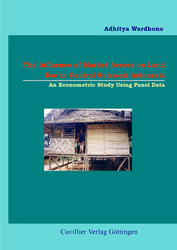| Fachbereiche | |
|---|---|
| Buchreihen (96) |
1381
|
| Nachhaltigkeit |
3
|
| Gesundheitswesen |
1
|
| Geisteswissenschaften |
2370
|
| Naturwissenschaften |
5408
|
| Mathematik | 229 |
| Informatik | 319 |
| Physik | 980 |
| Chemie | 1364 |
| Geowissenschaften | 131 |
| Humanmedizin | 243 |
| Zahn-, Mund- und Kieferheilkunde | 10 |
| Veterinärmedizin | 108 |
| Pharmazie | 147 |
| Biologie | 835 |
| Biochemie, Molekularbiologie, Gentechnologie | 121 |
| Biophysik | 25 |
| Ernährungs- und Haushaltswissenschaften | 45 |
| Land- und Agrarwissenschaften | 1005 |
| Forstwissenschaften | 201 |
| Gartenbauwissenschaft | 20 |
| Umweltforschung, Ökologie und Landespflege | 148 |
| Ingenieurwissenschaften |
1795
|
| Allgemein |
98
|
|
Leitlinien Unfallchirurgie
5. Auflage bestellen |
|
Erweiterte Suche
The Influence of Market Access on Land Use
An Econometric Study Using Panel Data
Anhitya Wardhono (Autor)Vorschau
Inhaltsverzeichnis, Datei (34 KB)
Leseprobe, Datei (53 KB)
This study aims to identify and analyse the influence of market access on land use of rural households in the vicinity of Lore Lindu National Park. The descriptive analysis addresses the ownership of land and the characteristics of land use with a special emphasis on market access. Moreover, the causal analysis seeks to answer the questions which micro-economic factors influence land use with special emphasis on market access. The analysis of land use is focused on the three major crops in the research area: paddy rice, cocoa, and coffee. Data was collected through a standardised, formal questionnaire from 264 randomly selected data in two-period surveys during the years 2001 and 2004. The objectives of the study are to: (1) explore the relationship between households’ access to market and land use as well as to describe the changes in land use between 2001 and 2004 with respect to the market access, (2) analyze the influence of market access on land use between 2001 and 2004 focusing on three main crops: paddy rice, coffee and cocoa, and (3) provide recommendations to support policy forms and implementation of a rural development program.
The issue of market access influencing the decision of the households to cultivate agricultural land use becomes a central theme in this study. Concerning the differences households of access to markets by the poverty group both survey periods is significant whereas 54% in 2001 and 62% in the year 2004 poorest households were able to reach markets. The percentage of the poorest and less poor group increased, but that of the poor group decreased in terms of the market access in both survey periods. It is striking that the households with the lowest access to markets are all classified as the poorest.
Using the two survey observations of a set of panel data for STORMA rural households, the econometric results have important implications for my understanding of the influences of the market access on land use pattern and determinant of the households using fertilizers. The Tobit and Probit model further provides evidence that several variables have a significant effect on the agricultural land use and the allocation of land by crop. These results may, in turn, inform the design of policies and projects directed at the development of upland agriculture and the conservation of forest and land resource in the vicinity of Lore Lindu National Park Sulawesi.
Furthermore, the econometric analysis shows that most of the market access variables significantly influence the households growing crops across the model of estimations. The study highlights the importance of market access for the household decision to grow paddy rice, coffee and cocoa. Another key factor affecting the decision of households to cultivate the farm lands associated with the market access is social capital. Ethnic affiliation has a statistically significant effect on the average share of the households growing paddy rice crops. The negative indication of the variable describes that the ownership of the non-indigenous ethnicity decreased the average share of the households growing paddy rice.
The second part of the econometric model examines the factors influencing the households’ fertilizer use. The Tobit random effect and probit random effect of the estimation models show that the number of the organisations as proxy of social capital and distance from homestead to market was statistically significant. With respect to the probability of the households’ fertilizer use, this study points out that the more accessible the market for households was, the greater the use of fertilizers.
The results of the analysis are used to suggest some policy conclusions with respect to the changing of land use and accessibility of market and improvement of human capital with respect to poverty alleviation.
| ISBN-13 (Printausgabe) | 3867272697 |
| ISBN-13 (Printausgabe) | 9783867272698 |
| ISBN-13 (E-Book) | 9783736922693 |
| Buchendformat | A5 |
| Sprache | Englisch |
| Seitenanzahl | 152 |
| Auflage | 1 |
| Band | 0 |
| Erscheinungsort | Göttingen |
| Promotionsort | Göttingen |
| Erscheinungsdatum | 02.07.2007 |
| Allgemeine Einordnung | Dissertation |
| Fachbereiche |
Land- und Agrarwissenschaften
|








